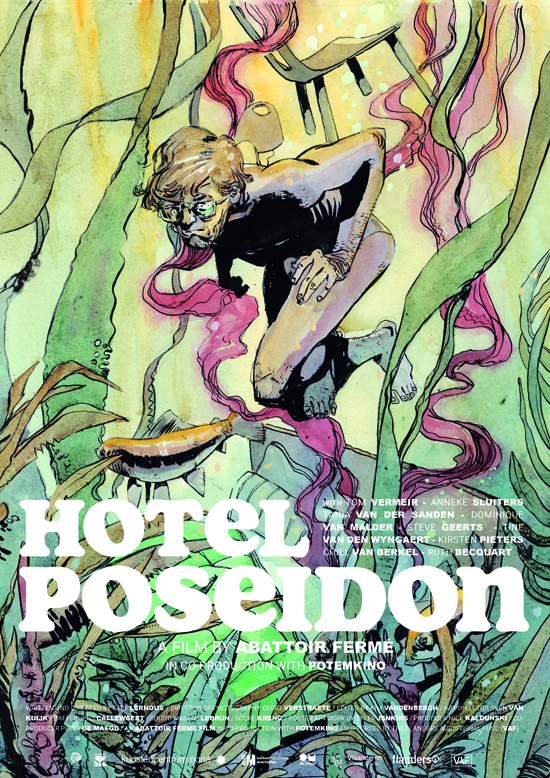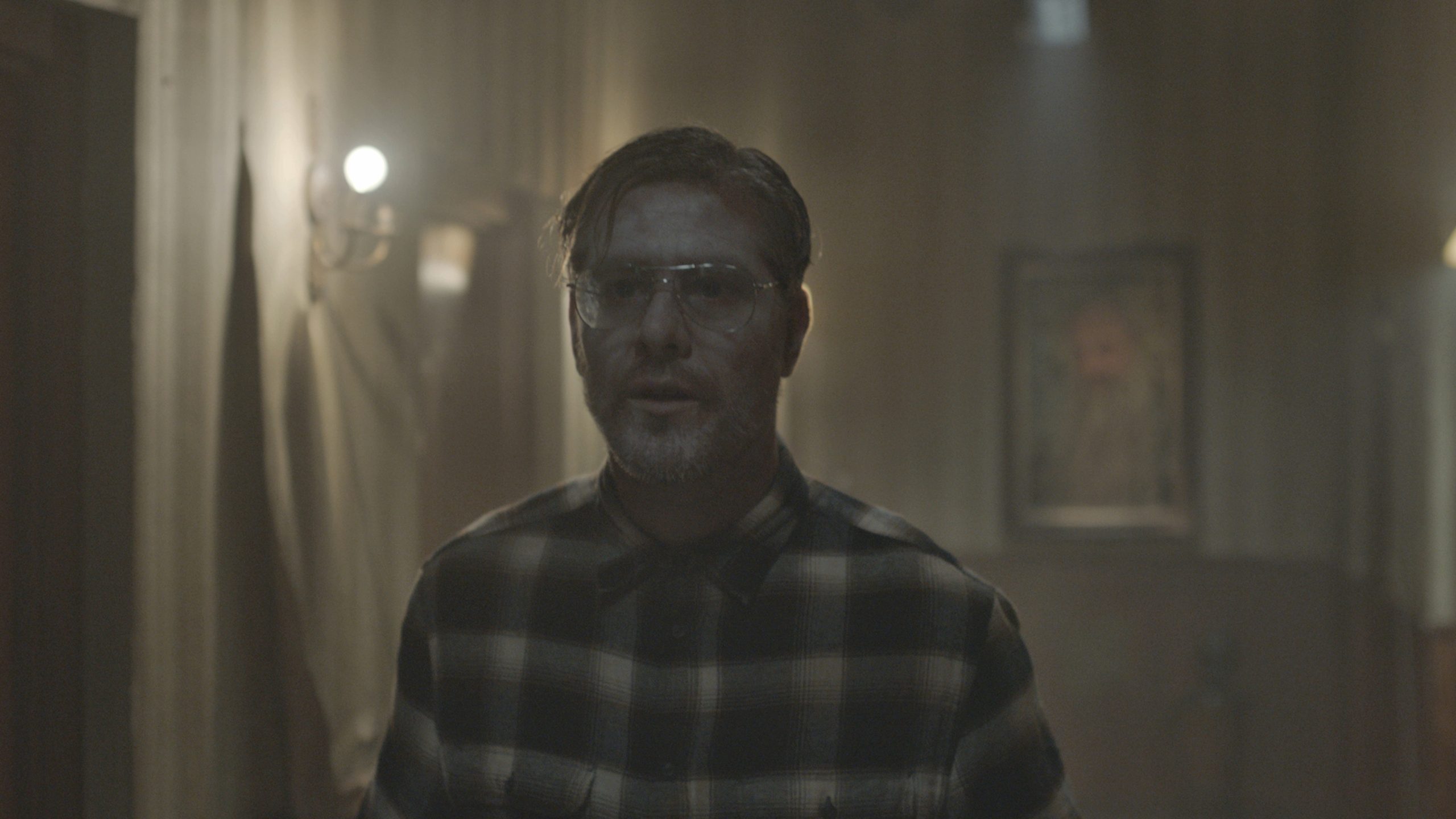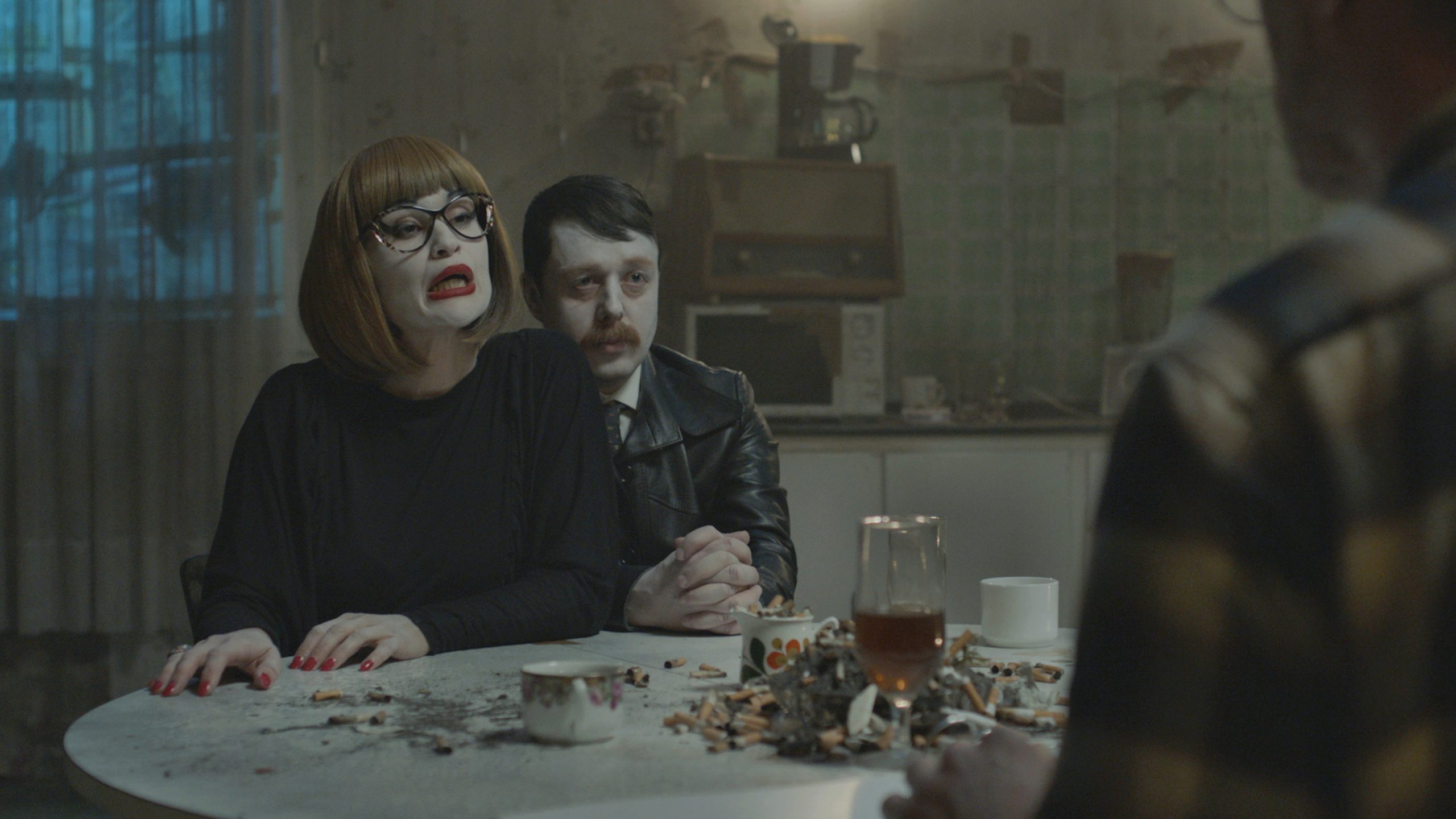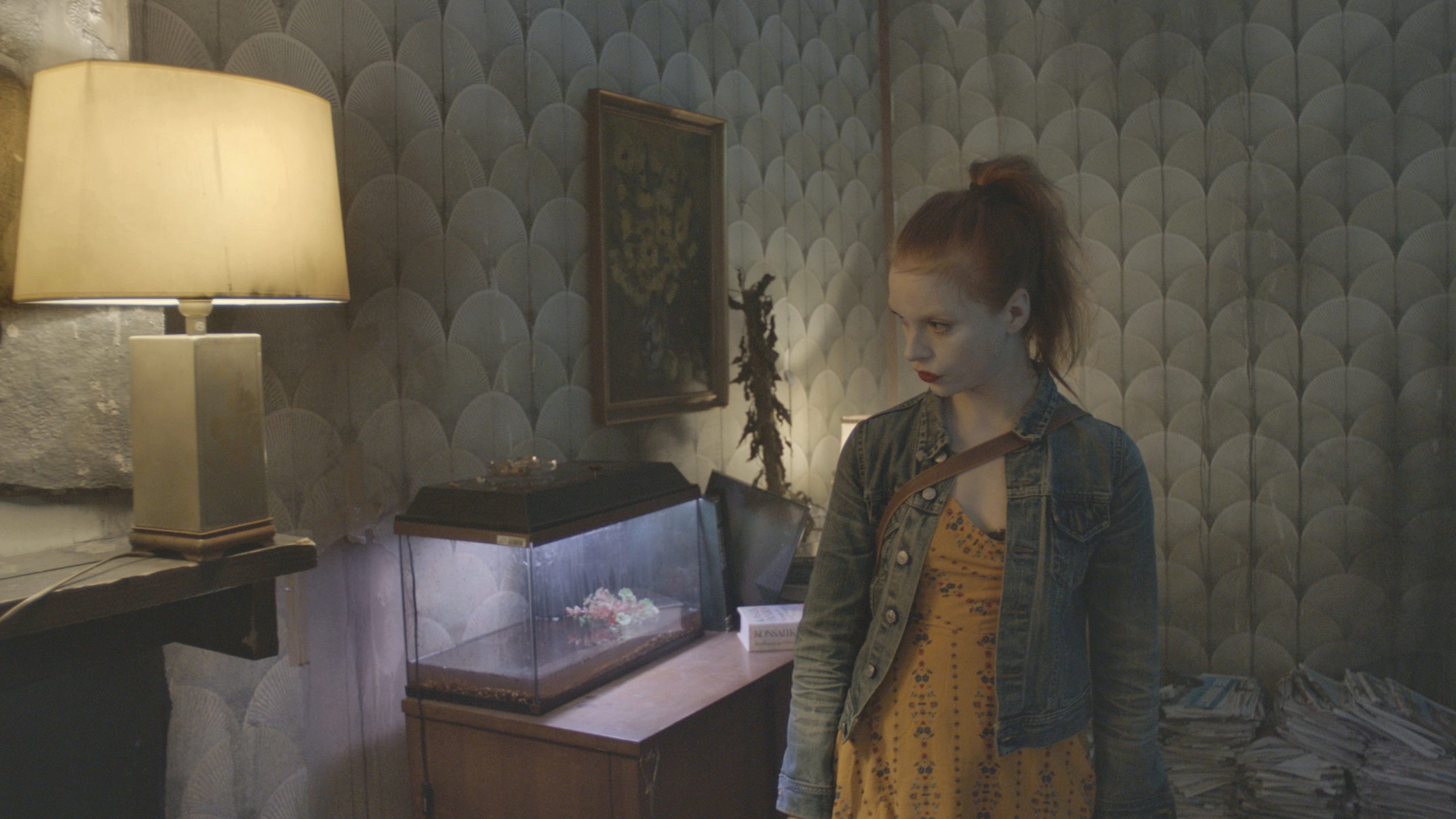Fantasia 2021, Part XVIII: Hotel Poseidon
 “Choulequec” is a 26-minute short film from France, written and directed by Benoit Blanc and Matthias Girbig, and it’s quite charming in an absurd way. It follows a man, Lucas Lesol (Girbig), searching for Alma (Billie Blain), his missing 16-year-old daughter. On a rural highway he crosses the city limits of the town of Choulequec and finds himself in a bizarre place where an officious sheriff, Chépair (one of two roles for Benoit Blanc), has made up absurd laws. It starts out less like Kafka and more like Alice In Wonderland, possessed of the same left-field logic, and as it goes on becomes increasingly surreal. Fiction bends in on itself, and we’re never sure if we’re watching the characters or watching the characters watch the characters. It’s a story abut stories, and it’s done very well with some very sharp ideas. I’m not sure the end quite resolves anything (in terms of either plot or theme), but the journey along the way is amusing and clever; you can see it for yourself here.
“Choulequec” is a 26-minute short film from France, written and directed by Benoit Blanc and Matthias Girbig, and it’s quite charming in an absurd way. It follows a man, Lucas Lesol (Girbig), searching for Alma (Billie Blain), his missing 16-year-old daughter. On a rural highway he crosses the city limits of the town of Choulequec and finds himself in a bizarre place where an officious sheriff, Chépair (one of two roles for Benoit Blanc), has made up absurd laws. It starts out less like Kafka and more like Alice In Wonderland, possessed of the same left-field logic, and as it goes on becomes increasingly surreal. Fiction bends in on itself, and we’re never sure if we’re watching the characters or watching the characters watch the characters. It’s a story abut stories, and it’s done very well with some very sharp ideas. I’m not sure the end quite resolves anything (in terms of either plot or theme), but the journey along the way is amusing and clever; you can see it for yourself here.
Bundled with the short was Hotel Poseidon, from Belgium, written and directed by Stef Lernous. Lernous is the artistic director of Abattoir Fermé, a theater company founded in 1999. Originally noted for its underground guerilla-theatre style, in recent years the company’s taken cinematic approaches to its staged works (which included an adult adaptation of Alice In Wonderland for the book’s 150th anniversary in 2015). They’ve performed opera and created TV shows, so cinema is a logical progression. Lernous talked a bit about the process of making the film in a question-and-answer session available on Fantasia’s YouTube page; there was only one draft of the script, and he was able to use exactly the actors he wanted in the roles he created. The result is a surreal, grimy film that lurches from sequence to sequence, with intentional swerves in tone and plot. It’s an interesting approach; I don’t think it really works.
The story’s set in the eponymous hotel, a decaying wreck owned by Dave (Tom Vermeir), a passive middle-aged man. He wanders the massive place he inherited some time before, stumbling from one scenario into another. On the same day his friend Jacki plans to host a concert, his aunt dies (with financial consequences for Dave), and a woman (Anneke Sluiters) turns up who insists on taking a room at the hotel even though it’s closed for business. And frankly disgusting: the hotel’s beyond dirty or dingy, an underlit and grotesque near-ruin. We watch Dave stumble through the day, see him attend the concert, see him suffer various humiliations, see him abducted and penned up in a large glass pen that oddly resembles the garden of Eden.
There isn’t really a story here, as such. Events follow from each other in a loose chain of cause and effect, but there isn’t the feel of a rising or falling arc. Dave himself remains characterless; there’s a reading of the film, I think, in which it is the story of his alternating attempts and refusals to engage with the world. The title of the movie seems to hint at something mythic, and the poster is an undersea image, but saving a dream sequence in the middle of the film I couldn’t see much to do with any story of Poseidon I could think of. Maybe it’s significant that Dave says his father collects fish, and maybe it isn’t. Then again, there’s a reading in which there’s a Christian mythic pattern, in which the hotel is a purgatory or hell. But if so, it’s hard to see what the point is, or how events in the hotel gain any significance thereby. If I really wanted to stretch it, I suppose I could see the film as a conflict of Christian and Greek myth; or possibly a fable about a crumbling patriarchy; but the movie doesn’t seem to insist on any reading or any coherent underlying sense.
Which is the problem. The film’s burdened by an excess of intuition, or at least that’s how it plays: it investigates one idea after another without a sense of structure or development. It’s engaging to look at, and does creative things with staging, set design, and sound. But it’s difficult to find a thread of meaning that leads all the way through the labyrinth.
 It is intriguing to look at. If the film’s aiming at a dreamlike feel, it’s important that the reality it creates be distinctive and all-encompassing. The production design manages this and then some. There’s an incredible level of detail in the hotel; every streak of organic matter on the walls, every busted light bulb, every abandoned mop, all adds up subliminally to make the place. It is in no way real, but is in every way vivid. The characters in the hotel are equally grotesque, caricatures out of Jeunet or Gilliam or Lynch, and they work as such because they are as extreme as the setting.
It is intriguing to look at. If the film’s aiming at a dreamlike feel, it’s important that the reality it creates be distinctive and all-encompassing. The production design manages this and then some. There’s an incredible level of detail in the hotel; every streak of organic matter on the walls, every busted light bulb, every abandoned mop, all adds up subliminally to make the place. It is in no way real, but is in every way vivid. The characters in the hotel are equally grotesque, caricatures out of Jeunet or Gilliam or Lynch, and they work as such because they are as extreme as the setting.
Dave wanders among them, bouncing from place to place. The film goes through odd tonal shifts as he does. Some of the scenes or sets of scenes he walks into have solid ideas animating them, others are more random, but they refuse to add up to anything coherent. It’s not simply a question of some scenes playing as comic and others much darker; and it’s not simply a question of a lack of plot coherency; it’s a question of the lack of inner logic and thematic coherency. If the film feels like a dream, that’s often because it has the purposelessness of a dream. An individual scene can be played with utter seriousness and sense of meaning in the moment. But once it ends, it might be largely forgotten.
 The result’s a little surprising in two ways. First, the movie often feels slow, not so much because of the actual pace as the lack of broader significance to anything, and especially the lack of emotional development. You can’t take a character seriously, however strong the acting, if the feelings they show don’t go anywhere. You simply wait, and eventually something different happens.
The result’s a little surprising in two ways. First, the movie often feels slow, not so much because of the actual pace as the lack of broader significance to anything, and especially the lack of emotional development. You can’t take a character seriously, however strong the acting, if the feelings they show don’t go anywhere. You simply wait, and eventually something different happens.
Secondly, the variety of the film actually undercuts its own creativity. There are lovely moments in it, and as noted the environment is a startling visual creation. The concert, when it comes, is a striking long take weaving in and among different characters. But it quickly becomes numbing. Again, one ends up waiting for the next moment to come, the next idea, the next scene. Instead of feeling like a whole, bound together by the development of a theme or character, the film becomes a bunch of individual bits.
 Hotel Poseidon is a movie that has the sheer filmmaking craft to do just what it wants, building a filthy and decayed setting and following its main character through a range of surreal incidents. At one viewing I do not see a coherent theme in the movie. I see several possible themes, but nothing that the action on screen insists upon. It does feel as though there is matter here, as though watching it again might give me a way to connect the dots in a way that gives the thing more meaning. Certainly I can understand why some viewers might love the movie. As of right now, though, I can’t feel it.
Hotel Poseidon is a movie that has the sheer filmmaking craft to do just what it wants, building a filthy and decayed setting and following its main character through a range of surreal incidents. At one viewing I do not see a coherent theme in the movie. I see several possible themes, but nothing that the action on screen insists upon. It does feel as though there is matter here, as though watching it again might give me a way to connect the dots in a way that gives the thing more meaning. Certainly I can understand why some viewers might love the movie. As of right now, though, I can’t feel it.
Find the rest of my Fantasia coverage from this and previous years here!
Matthew David Surridge is the author of “The Word of Azrael,” from Black Gate 14. You can buy collections of his essays on fantasy novels here and here. His Patreon, hosting a short fiction project based around the lore within a Victorian Book of Days, is here. You can find him on Facebook, or follow his Twitter account, Fell_Gard.
[…] “Fantasia 2021, Part XVIII: Hotel Poseidon“—”Choulequec” is a 26-minute short film from France, written and directed by Benoit Blanc and Matthias Girbig, and it’s quite charming in an absurd way. It follows a man, Lucas Lesol (Girbig), searching for Alma (Billie Blain), his missing 16-year-old daughter. On a rural highway he crosses the city limits of the town of Choulequec and finds himself in a bizarre place where an officious sheriff, Chépair (one of two roles for Benoit Blanc), has made up absurd laws. It starts out less like Kafka and more like Alice In Wonderland, possessed of the same left-field logic, and as it goes on becomes increasingly surreal.” “Hotel Poseidon is a movie that has the sheer filmmaking craft to do just what it wants, building a filthy and decayed setting and following its main character through a range of surreal incidents. At one viewing I do not see a coherent theme in the movie. I see several possible themes, but nothing that the action on screen insists upon. It does feel as though there is matter here, as though watching it again might give me a way to connect the dots in a way that gives the thing more meaning. Certainly I can understand why some viewers might love the movie. As of right now, though, I can’t feel it.” Watch “CHOULEQUEC (court-métrage)“. Also watch “Hotel Poseidon“, official trailer. […]